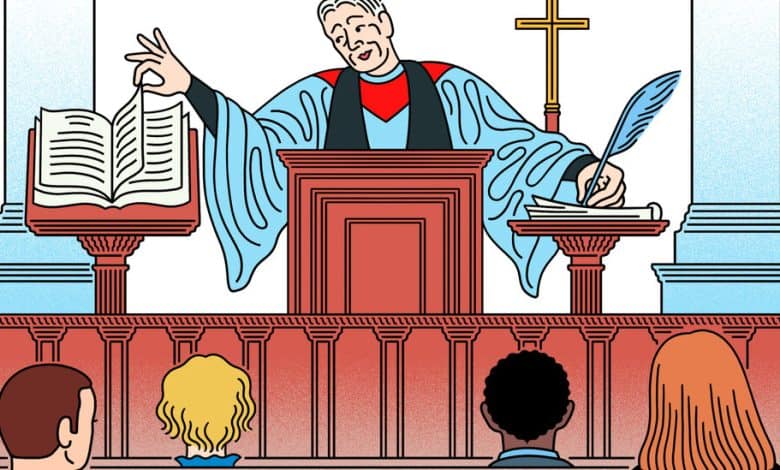Should I Confront Our Former Minister Over His Plagiarized Sermons?

I have an ethical problem, or rather, the retired minister of my church has one, and I don’t know what to do about it. After his retirement several years ago, some of us decided to gather his sermons from the past 10 years or so into a bound volume and present it to him. We would also put one into our library and make the digital version available on the members-only part of our website. We set out to work on proofing the sermons for typos, grammatical errors and missing citations.
Then we discovered something egregious: He had “borrowed” great swaths of text from stories, articles and online writing and presented them as his own. One example involved an amusing story that just happened to be lifted nearly whole from an Eat column in this very magazine. There was a very moving account of his visit to a local monastery, taken almost verbatim from an article — only the name and location of the monastery were changed. On and on it went, with as many as five or more instances of plagiarism in every single sermon.
He always presented himself as an erudite, eloquent writer; his sermons could be mesmerizing and inspiring. As a fellow writer, I was impressed by the depth and breadth of his reading.
Now the proofers know that he was not just reading but also trolling for copy. We are aghast. We are also near the end of the project. I presented our findings to the president of our board, who considers him a friend. Her advice was to stop the proofing, make just one bound copy (for our retired minister, not our library) and send the digital version only to those who requested it. We are also removing any of the footnotes we made directing people to a “similar” (ahem) article or story that he plundered. Some might discover his theft if they follow these publications, but most will not.
While this work would allow the project to be finished and presented to both our former minister and the congregation, I feel more and more unwilling to let his plagiarism slide. I want to tell him what we found. I would write only to him, and would not say a word to anyone else at the church. I do not want to shame him publicly, but I do want him to know that the small group who read and researched them with great care is aware of what he did, and is appalled. Perhaps I would use a less damning word — “disappointed”?
His actions make those of us who respected and admired him look like fools, especially because he’s a man of the cloth. But those of us who know what he did are not without compassion. He is elderly and has an ailing spouse. He is very proud of his years as a pastor. Should I tell him I know? — Name Withheld